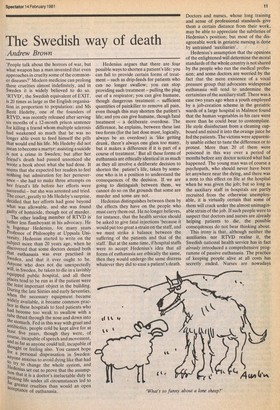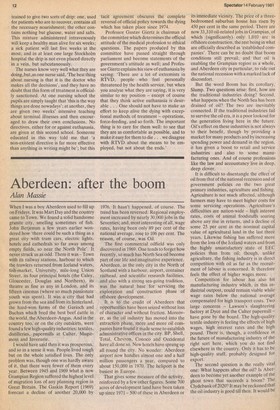The Swedish way of death
Andrew Brown
'People talk about the horrors of war, but what weapon has a man invented that even approaches in cruelty some of the commoner diseases?' Modern medicine can prolong these cruelties almost indefinitely, and in Sweden it is widely believed to do so. 'RTVD', the Swedish equivalent of EXIT, is 20 times as large as the English organisation in proportion to population; and Ms Bent Hedeby, one of the founders of RTVD, was recently released after serving six months of a 12-month prison sentence for killing a friend whom multiple sclerosis had weakened so much that he was no longer able even to feed himself the pills that would end his life. Ms Hedeby did not mean to become a,martyr: assisting a suicide IS not a crime in Sweden; but after her friend's death had passed unnoticed she wrote a book about what she had done. It seems that she expected her readers to feel nothing but admiration for her perseverance she had to make three attempts on her friend's life before her efforts were successful but she was arrested and tried. The court, greatly to Ms Hedeby's surprise, decided that her efforts had gone beyond What was allowable, and she was found guilty of homicide, though not of murder.
The other leading member of RTVD is rather less flamboyant in his advocacy. He IS Ingemar Hedenius, for many years Professor of Philosophy at Uppsala University. Hedenius started to write on the subject more than 20 years ago, when he discovered that some doctors denied both that euthanasia was ever practised in Sweden, and that it ever ought to be. Anyone who does not die unexpectedly Will, in Sweden, be taken to die in a lavishly equipped public hospital, and all these places tend to be run as if the patient were the least important object in the building. During the late Sixties and early Seventies, When the necessary equipment became • IdelY available, it became common practice in these hospitals to feed patients who had become too weak to swallow with a tube thrust through the nose and down into the,stomach. Fed in this way with gruel and a. ntiblotics, people cold be kept alive for at least five years, though they were, of course, incapable of speech and movement, 4..nd as far as anyone could tell, incapable of !nought or feeling also. You cannot hope ator a personal dispensation in Sweden: nYone anxious to avoid dying like that had try to change the whole system, and 1,1edemus set out to prove that the assumpr_lf_un that it is a doctor's ineluctable duty tous. oto life under all circumstances led to far greater cruelties than would an open acceptance of euthanasia. Hedenius argues that there are four possible ways to shorten a patient's life: you can fail to provide certain forms of treatment such as drip-feeds for patients who can no longer swallow; you can stop providing such treatment pulling the plug out of a respirator; you can give humane, though dangerous treatment sufficient quantities of painkiller to remove all pain, even though this may shorten the patient's life; and you can give humane, though fatal treatment a deliberate overdose. The difference, he explains, between these last two forms (for the last dose must, logically, always be an overdose) is 'like getting drunk, there's always one glass too many, but it makes a difference if it is part of a course of treatment.' But all these forms of euthanasia are ethically identical in as much as they all involve a deliberate decision to shorten the patient's life, taken by someone who is in a position to understand the consequences of the decision. If we are going to distinguish between them, we cannot do so on the grounds that some are murder and some are not.
Hedenius distinguishes between them by the effects they have on the people who must carry them out. He no longer believes, for instance, that the health service should be asked to give fatal injections 'because it would put too great a strain on the staff, and we must strike a balance between the suffering of the patients and that of the staff.' But at the same time, if hospital staffs were to accept Hedenius's idea that all forms of euthanasia are ethically the same, then they would undergo the same distress whatever they did to ease a patient's death. Doctors and nurses, whose long training and sense of professional standards give them a certain distance from their work, may be able to appreciate the subtleties of Hedenius's position; but most of the disagreeable work in geriatric nursing is done by untrained 'auxiliaries'.
Hedenius's assumption that the opinions of the enlightened will determine the moral standards of the whole country is not shared by the people who run the medical profession; and some doctors are worried by the fact that the mere existence of a vocal , pressure group that advocates widespread euthanasia will tend to undermine the certainties of the auxiliary staff. There was a case two years ago when a youth employed by a job-creation scheme in the geriatric wards of a large hospital in Malmoe found that the human vegetables in his care were more than he could bear to contemplate. He stole disinfectant from a cleaning cupboard and mixed it into the orange juice he fed the patients. The victims were apparently unable either to taste the difference or to protest. More than 20 of them were poisoned in this way over a period of months before any doctor noticed what had happened. The young man was of course a psychopath, who should never have been let anywhere near the dying, and there was a note to this effect on file at the hospital when he was given the job; but so long as the auxiliary staff in hospitals are partly recruited from the otherwise unemployable, it is virtually certain that some of them will crack under the almost unimaginable strain of the job. If such people were to suspect that doctors and nurses are already helping patients to die, the possible consequences do not bear thinking about.
This irony is that, although neither the auxiliaries nor RTVD realise it, the Swedish national health service has in fact already introduced a comprehensive programme of passive euthanasia. The practice of keeping people alive at all costs has secretly ended. Nurses are nowadays trained to give two sorts of drip: one, used for patients who are to recover, contains all the necessary nourishment; the other contains nothing but glucose, water and salts. This mixture administered intravenously will keep a healthy man alive for six weeks; a sick patient will last five weeks at the most; and in at least one large Stockholm hospital the drip is not even placed directly in a vein, but subcutaneously.
The nurses know very well what they are doing,but,as one nurse said, The best thing about nursing is that it is the doctor who makes all the decisions', and they have no doubt that this form of treatment is officially sanctioned. At one nursing school the pupils are simply taught that 'this is the way things are done nowadays'; at another, they are given two weeks' intensive teaching about terminal illnesses and then encouraged to draw their own conclusions. No directives, either for or against euthanasia, are given at this second school. Someone educated in this way told me that 'a non-existent directive is far more effective than anything in writing might be'; but this tacit agreement obscures the complete reversal of official policy towards the dying which has taken place since 1974.
Professor Gustav Giertz is chairman of the committee which determines the official attitude of the medical profession to ethical questions. The papers produted by this committee have passed straight through parliament and become statements of the government's attitude as well; and Professor Giertz explains his view of euthanasia by saying: 'There are a lot of extremists in RTVD, people who feel personally threatened by the health service, but when you analyse what they are saying, it is very similar to my position — except of course that they think active euthanasia is desirable . . . One should not have to make an effort to keep alive the dying with exceptional methods of treatment — operatiOns, force-feeding, and so forth. The important thing is to care for them well: to see that they are as comfortable as possible, and to make it easy for them to die. . . we disagree with RTVD about the means to be employed, but not about the ends.'







































 Previous page
Previous page